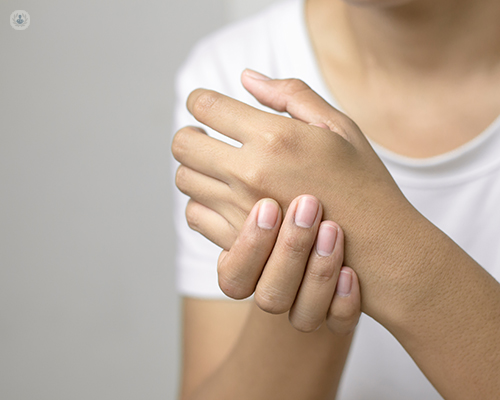Hand conditions and surgery
Written by:Hand problems are common and will affect many of us during our lifetime. Despite hand injuries often resulting in a visit to a hand clinic, the majority of patients will have common and usually easily treatable problems.

What are the most common reasons for hand surgery that you see in clinic?
Hand problems are often aggravated by minor injuries, or they happen after periods of repetitive activities, or alternatively they happen after new and sometimes strenuous activities.
The most common hand condition that I see in my clinic is carpal tunnel syndrome. This condition normally presents itself with pins and needles and numbness in the hands, although pain is also a very common feature.
Other very common conditions are:
- Trigger finger - with this condition, the fingers lock painfully and won’t bend or extend due to inflamed tendons
- Lumps – lumps on the hand and wrist are often ganglions (sacs of fluid) and may require surgical removal
- Arthritis in the hand - pain and stiffness of the joints
- Dupuytren’s disease - one or more of the fingers progressively become more bent
All of the above-mentioned conditions may require a variety of treatments, which include:
- Splinting
- Physiotherapy
- Painkillers
- Steroid injections
When these fail to treat the hand condition, surgery is the next available option.
What are the different types of hand surgery?
All of the above conditions have their own specific operations regarding surgical treatment.
Hand surgery can often be performed under a local anaesthetic while the patient is fully awake, although some of the more complex operations will require a general anaesthetic for the operation to be completed, such as operations for hand arthritis and Dupuytren's.
Does hand surgery carry risks?
Every operation carries risks and these will be fully explained to the patient by the surgeon. Some risks are relevant to all hand surgery operations:
- The presence of a scar
- Infection (which is about 1 per cent)
- Bleeding
- Stiffness in the hand
While the above risks all generally apply to hand surgery, other risks such as numbness and recurrence of the condition can be more specific to certain procedures.
What can I expect following hand surgery? Will I need physiotherapy?
Post-operative physiotherapy is often but not always required. For smaller procedures performed under local anaesthetic, movement early-on during recovery is usually encouraged. Movement is typically normal by the 6-week review.
For surgery involving tendons and joints, physiotherapy and splintage may be more important in the rehabilitation process. Up to six physiotherapy sessions may be required after the surgery in order to reach a full recovery.
If you’re worried about hand injuries or would like to know more about hand surgery, don’t hesitate to arrange an appointment with one of our leading hand surgeons.


